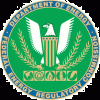The Federal Energy Regulatory Commission, or FERC, is an independent agency that regulates the interstate transmission of electricity, natural gas, and oil. FERC also reviews proposals to build liquefied natural gas (LNG) terminals and interstate natural gas pipelines as well as licensing hydropower projects. The Energy Policy Act of 2005 gave FERC additional responsibilities as outlined in FERC’s Top Initiativesand updated Strategic Plan. As part of that responsibility, FERC:
- Regulates the transmission and wholesale sales of electricity in interstate commerce;
- Reviews certain mergers and acquisitions and corporate transactions by electricity companies;
- Regulates the transmission and sale of natural gas for resale in interstate commerce;
- Regulates the transportation of oil by pipeline in interstate commerce;
- Approves the siting and abandonment of interstate natural gas pipelines and storage facilities;
- Reviews the siting application for electric transmission projects under limited circumstances;
- Ensures the safe operation and reliability of proposed and operating LNG terminals;
- Licenses and inspects private, municipal, and state hydroelectric projects;
- Protects the reliability of the high voltage interstate transmission system through mandatory reliability standards;
- Monitors and investigates energy markets;
- Enforces FERC regulatory requirements through imposition of civil penalties and other means;
- Oversees environmental matters related to natural gas and hydroelectricity projects and other matters; and
- Administers accounting and financial reporting regulations and conduct of regulated companies.
FOIA: http://www.ferc.gov/legal/ceii-foia/foia.asp
Budget Requests
- » FY 2015 Congressional Performance Budget Request
- » FY 2014 Congressional Performance Budget Request
Strategic Plan FY 2014–FY 2018





